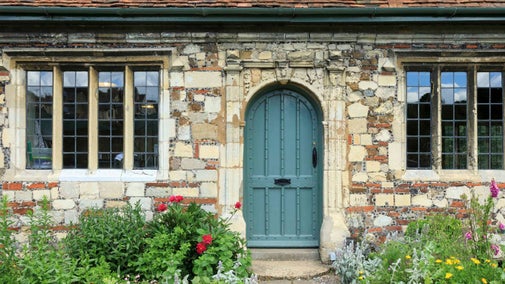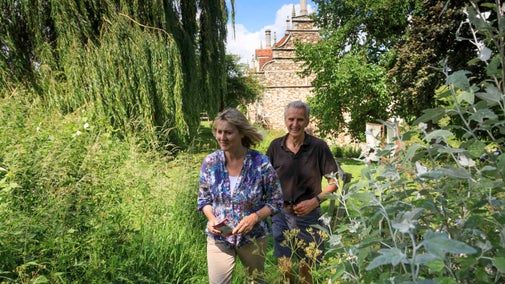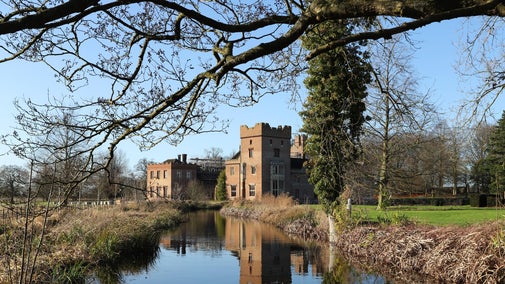
Discover more at Bourne Mill
Find out when Bourne Mill is open, how to get here, the things to see and do and more.

Bourne Mill has a long and fascinating history, and thanks to funding from the Heritage Lottery Fund, we’ve been able to delve deeper into the mill’s history and embark on projects to share its story. Find out more about how we’ve uncovered Colchester’s social and industrial past, and the work we do to preserve this fascinating history.
Bourne Mill has a rich history, and it’s important that we share its story in ways that best reflects its social and industrial past. In 2016, the National Trust embarked on a project with students from the University of Essex to reinterpret the mill, as part of a Heritage Lottery Funded project called ‘Bourne Mill – Uncovering Colchester’s Social and Industrial Past.’
Working with Essex County Council, the project focused on the history of Bourne Mill, the people who lived here, and its industrial significance in the East Anglian cloth industry. The centrepiece was the reconstruction of a working replica of bicycle-powered fulling stocks, which you can see at the mill today.
We also undertook further research into the mill’s history, which you can read about below, and with the help of students from the University of Essex, created educational resources to engage young people with the mill’s historical significance.
The aims of the project were to:
The project was completed in 2016, but you can still see its legacy at the mill today.

The volunteer team at Bourne Mill are passionate about this place and have researched various aspects of the mill’s history.
To improve our knowledge, under the Heritage Lottery project, we commissioned a historical report from Dr Chris Thornton, and another report exploring the role of food and entertain in the mill’s history from Ivan Day – both of which are available upon request.
Volunteers from the Colchester Decorative and Fine Arts Society also contributed to research which informed the project.
Over the centuries Bourne Mill has functioned as both a grain mill and a fulling (cloth-treating) mill. The mill stopped working in 1935, and in 1936 it was bought by the National Trust, which has been meeting the challenges of conserving the sixteenth-century stonework, the working waterwheel, and the millpond and mill grounds ever since.
To keep the waterwheel turning, the team at Bourne Mill undertake repair works every other year to resolve issues caused by the waterwheel permanently sitting in water, or the culverts being too shallow.
The mosaic of different stones needs to be looked after in a particular way. Some methods in the past haven't been suitable, so some work is 'repair and restore' while other work requires us to 'conserve and preserve'.
The Physic Garden at the front of Bourne Mill was created by volunteers in 2015, thanks to donations of plants from all over. Herbs and plants would have been grown and used for medicinal purposes throughout history, and the volunteers have reflected this history with the planting in the Physic Garden today.
Celebrating diversity across Colchester and the importance of an enriched healthy community for both people and nature, ‘Bourne to be Wild’ takes inspiration from the wildlife in the city of Colchester and Bourne Mill. The print-based project aims to rewild the urban streets and by bringing visuals interpretive artwork to the city.
The project began with a series of workshops between September and November facilitated by INSTAR. Working with community groups based in the city including, Firstsite’s Young Art Kommunity, Level Best Trainees, and Outhouse’s Youth Group and Craft Pride, they offered a hybrid of wildlife exploration and nature inspired printmaking activities, nurturing confidence, creativity, community and friendship throughout.
With your ongoing support, we're able to continue our vital conservation work. Thank you for helping to protect these special places.

Find out when Bourne Mill is open, how to get here, the things to see and do and more.

Inspiring, leading and resourcing the UK’s heritage to create positive and lasting change for people and communities, now and in the future.

We’re a university where curiosity prevails, and where exploring new ways of thinking and pushing boundaries, isn’t just encouraged, it’s expected.

Welcome to Essex.
From a monks' fishing spot to an Elizabethan banqueting house to a fulling mill, Bourne Mill's history is inseparable from the town of Colchester's. Discover its rich story here.

Explore the millpond, bug hotel and stumpery in the grounds at Bourne Mill and take a stroll around to fully appreciate the exterior of the 16th-century mill.

With its fulling stocks and 72-bucket waterwheel, Bourne Mill offers a fascinating peek into the history of Colchester's textile industry. Explore its highlights on a tour of the mill.

We believe that nature, beauty and history are for everyone. That’s why we’re supporting wildlife, protecting historic sites and more. Find out about our work.

Read about our strategy, which focuses on restoring nature, ending unequal access and inspiring more people.
